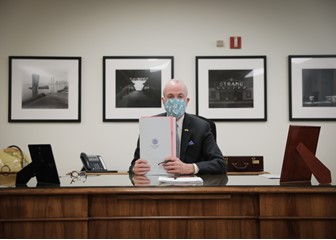TRENTON – On Feb. 22, NJ Governor Phil Murphy signed historic adult-use cannabis reform bills into law, legalizing and regulating cannabis use and possession for adults 21 years and older (A21 – “The New Jersey Cannabis Regulatory, Enforcement Assistance, and Marketplace Modernization Act”) and decriminalizing marijuana and hashish possession (A1897). The Governor also signed S3454, clarifying marijuana and cannabis use and possession penalties for individuals younger than 21 years old.
“Our current marijuana prohibition laws have failed every test of social justice, which is why for years I’ve strongly supported the legalization of adult-use cannabis. Maintaining a status quo that allows tens of thousands, disproportionately people of color, to be arrested in New Jersey each year for low-level drug offenses is unjust and indefensible,” said Governor Murphy. “This November, New Jerseyans voted overwhelmingly in support of creating a well-regulated adult-use cannabis market. Although this process has taken longer than anticipated, I believe it is ending in the right place and will ultimately serve as a national model.
“This legislation will establish an industry that brings equity and economic opportunity to our communities, while establishing minimum standards for safe products and allowing law enforcement to focus their resources on real public safety matters,” continued Governor Murphy. “Today, we’re taking a monumental step forward to reduce racial disparities in our criminal justice system, while building a promising new industry and standing on the right side of history. I’d like to thank the Legislature, advocates, faith leaders, and community leaders for their dedicated work and partnership on this critical issue.”
Under A21, the Cannabis Regulatory Commission (CRC) will promulgate regulations to govern the medical and adult-use industries and oversee the applications for licensing of cannabis businesses. The legislation further provides for the Legislature to reinvest cannabis revenues in designated “impact zones”; directs the CRC to promote diversity and inclusion in business ownership; and contains critical employment protections for people who engage in lawful behavior with respect to cannabis.
A1897 reforms criminal and civil penalties for marijuana and hashish offenses, as well as provides remedies for people currently facing certain marijuana charges. The bill prevents unlawful low-level distribution and possession offenses from being used in pretrial release, probation, and parole decisions and provides certain protections against discrimination in employment, housing, and places of public accommodation. The bill also creates a pathway to vacate active sentences for certain offenses committed before enactment of the enabling legislation.
The Governor also signed S3454 into law, clarifying penalties for marijuana and cannabis possession and consumption for individuals younger than 21 years old. The legislation corrects inconsistencies in A21 and A1897 concerning marijuana and cannabis penalties for those underage.
“I have been working on decriminalizing adult-use marijuana for well over three years now, and I am happy to finally see it become a reality,” said Senator Ronald Rice. “This is a common-sense and just law that gives an equal playing field for folks in communities of color. Many have argued that legalizing adult-use marijuana has been for social, economic and criminal justice, however, decriminalization for me, is equally as important. I will continue to watch closely and fight to ensure communities of color are treated equally.”
“The failed War on Drugs has systematically targeted people of color and the poor, disproportionately impacting Black and Brown communities and hurting families in New Jersey and across our nation,” said U.S Senator Cory Booker. “Today is a historic day, and I applaud Governor Murphy, the legislature, and the many advocates for racial and social justice whose leadership is ensuring that New Jersey is at the forefront of equitable marijuana legalization policy. I will continue to work with my colleagues in the Senate to end the federal marijuana prohibition so we can finally begin healing the wounds of decades of injustice.”
“I am proud to have been a driving force behind the most progressive decriminalization law in the country and I am grateful to finally see it enacted,” said Senator Teresa Ruiz. “Every day roughly 100 people in New Jersey are arrested for marijuana possession, this law is a move that offers individuals a second chance and ensures they do not become entangled in the criminal justice system. This is yet another step towards bringing justice and equity to our communities. Going forward, we must continue to look for creative solutions to reverse the generational impact the War on Drugs has had.”
“This new law includes real, enterprising opportunities for New Jersey communities that have been disproportionately impacted by cannabis prohibition, along with more defined employment opportunities and a commission that requires diversity,” said Assemblywoman Britnee Timberlake. “This will be a clear revenue generator for the State, and the social justice and diversity portion in the legislation remains imperative.”
“Decriminalization and expungement for those who have been disproportionately incarcerated for marijuana offenses is well overdue in New Jersey and many other states throughout this nation. A criminal marijuana charge has a detrimental effect on an individual’s opportunity to access higher education, obtain gainful employment, receive housing support, and address child custody issues. Not all communities are impacted equally by marijuana enforcement, measures to reduce the collateral consequences of criminal records are ones of racial, social, and economic justice. This is about social justice for a people who have endured the inequities in the law for generations.”


